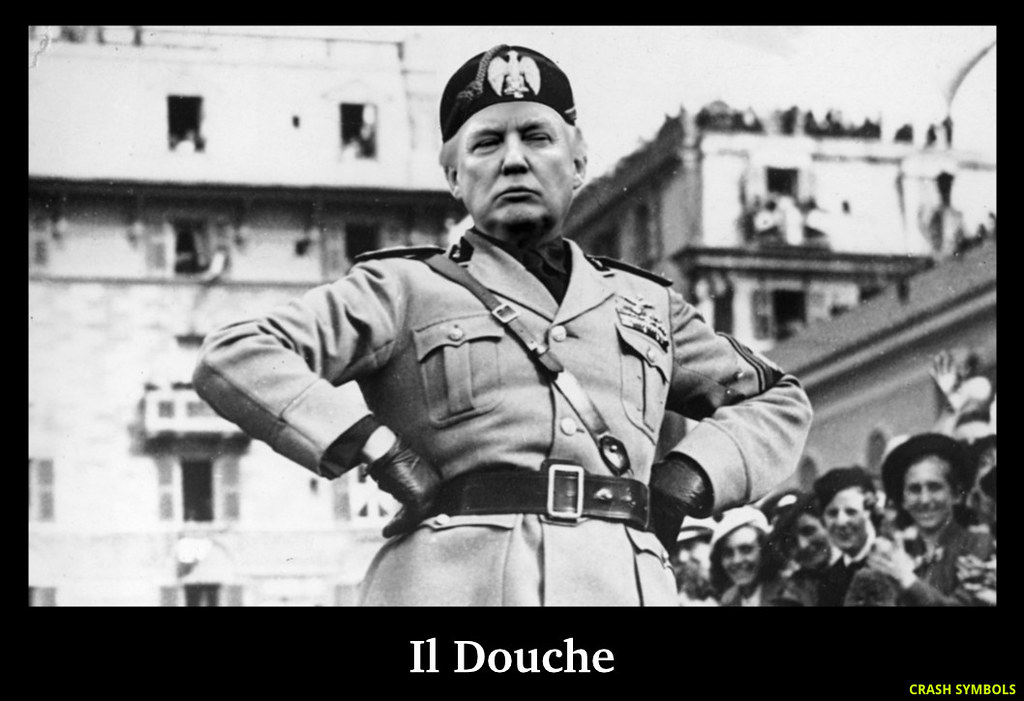 Here it is, our regular Friday diet of suggested readings for the weekend:
Here it is, our regular Friday diet of suggested readings for the weekend:
Daniel Defoe and the lure of utopias and dystopias.
The right way to say ‘I’m Sorry’ (read it, for your own good).
Can we live with contradiction? (and should we?).
Trump is violating the Constitution (say Constitutional lawyers).
How Think Tanks became engines of royal propaganda (and why you can’t trust them today).
Not yet falling apart, two very different views of conservatism from the Left.

The joker in all discussions of Democracy vis-a-vis Capitalism, is that corporations, which make up the body of capitalist activity, are almost exclusively run on a hierarchic structure as dictatorships or oligarchies. In the US, the governments, at the federal level and all levels below it, are democratically elected and bound to function according to principles laid down in the Constitution. These two realms are not necessarily compatible.
Recently, for the first time, a creature from the corporate world found its way into the zoo of Government, with results that are becoming all too apparent.
LikeLiked by 1 person
I liked your post for the top part but the bottom, our government officials are hardly democratically elected and after election, have a lack of accountability to the public without a deliberative system of democracy.
LikeLiked by 1 person
wtc,
Keep in mind democracy is more a process for selecting a leader and the company he keeps, than any mass deliberation of laws. They serve a function, in maintaining the country as a singular entity. If everyone just went off on their own preferences, there would be no country.
LikeLike
Democracy at the core is that the public is involved in decision making. Selecting leaders by “voting” is no more democratic in a Capitalist system than voters in Iran “voting” in interfered elections. But of course that’s what you think is democratic, regurgitating slogans. People in North Korea consider their country free too, and their leader benevolent. Because that’s what freedom and benevolence means, in the North Korean definition. Who cares about the core principle right? Let’s just repeat what the elites say.
LikeLike
The state of capitalism today;
http://market-ticker.org/akcs-www?post=231832
LikeLike
brodix: “Keep in mind democracy is more a process for selecting a leader and the company he keeps, than any mass deliberation of laws. ”
Also saphsin.
My wife is just coming off of a 4-year stint as mayor of our small (1200) town, and my remarks on democracy and Constitutional procedure are more affected by the spirit that I see working in the messy world of small-scale government than in the discrepancies between ideal and real democracy in 21st-century Washington, D.C.
LikeLike
Sure, it’s affected by the spirit. Just like the spirit of the citizens in North Korea who believe in the benevolence in their leader.
LikeLike
wtc,
Think in terms of scale. Say water pressure at sea level and 3000 feet down. That’s the difference between politics at the local level and federal level. Yes, at the local level, there is constant feedback, but the further up the ladder, the more the factors involved and the less it’s about personality and more economic and political force. That’s why it helps to keep in mind basic physics and math and not get all stirred up by the personalities.
LikeLike
brodix, it’s hard to argue with you about the corruption produced by size and scale. But that suggests that we should look for a cure in a reduction of scale, in fragmentation of large political entities. It would seem that good government is only possible at the community level, where the leaders and the governed all know each other personally. But my wife’s experience has been that the same divisive tendencies of human nature operate at the village level, and we have often commented, on observing the governmental throes of recent times, “as above, so below.”
LikeLike
saphsin.
I said “In the US, the governments, at the federal level and all levels below it, are democratically elected and bound to function according to principles laid down in the Constitution.”
That is a statement of fact, about how it is meant to work. The US government works perfectly on paper, but as often happens when something is assembled from parts, the result is sometimes far from perfect. I can’t say how the government of North Korea is supposed to work, but I expect the instruction manual may be different from ours.
LikeLike
wtc,
There are both advantages and disadvantages to scale. That’s why I don’t really see government as the problem. It is messy.
Consider economics though. Back when groups of people were both small enough to know everyone else and fundamentally dependent on those relationships for survival, reciprocity was both fundamental and organic. You did what you could for others and they returned the favor. As groups grew larger, the methods of accounting for these relationships grew more elaborate and precise. Whether it was symbolic tokens or receipts for some communal property, like grain in a communal granary. That’s how the gold based system developed, in that it was easier and safer to trade contracts for stored gold, than transport it around and these contracts were the basis for the modern monetary system.
Today, it is all contracts, derivatives of contracts, contracts sliced and diced like sausage. IOU’s, basically.
So we no longer have to rely on each other, just these institutions holding our stash of contracts, i.e. bank accounts. We still think of it as some form of commodity that can be mined or manufactured, from gold to bitcoin, yet it is really just promises from scores of other people. People who we don’t know, only that they have signed their name to some obligation.
Yet we emotionally process this “savings” as quantified hope, whether for a new car, retirement, or our child’s future.
Keep in mind that political careers are based on how much hope they can generate and direction they can give to the most people. Consequently there is strong political incentive to create lots of money/wealth.
The problem is the tendency to cheat, i.e. create more of an illusion of wealth, than actual social and community value. Along with the lottery theory, to advertise the success of a few, as motivation for the rest.
Now government started as what we would call, “private enterprise,” as those with the power and drive told everyone else what to do, but we eventually created communal institutions to make it a more public function, because this is more stable.
Today we are going through a similar situation with finance, as much of this illusion of value is based on promises that can not be kept and investments with no real potential, other than they looked and sounded good.
So how do we make democracy work? For one thing, we do have various levels, local, state, regional, national, international bodies, which delegates authority to the levels it is most effective and responsive. Yes, the bigger ones step on the little ones, but then the little ones eventually band together or otherwise infiltrate the larger ones, in various convective cycles.
So how would we apply this to finance as a public function? For one thing, there would be those various layers of systems of accounting. Local community banks would serve their populations and invest in local infrastructure, rather than just sending these saving off to big banks in NYC, for the promise of greater returns. Which are ultimately often just bigger bubbles.
Regional banks would serve broader needs and federal system would serve national and international functions. Possibly with those local banks serving as shareholders in the larger ones, as a method of regulation.
Also keep in mind that much of what is considered savings is government debt. This money is not really invested, as it is spent of lots of things, from welfare to warfare to funding research that the private sector mostly benefits from. The interest is just paid off with further debt and presumably greater savings and wealth!
What if the government was to threaten to tax excess wealth out of the economy and not just borrow it? People would quickly find other ways to store value, than as money in their bank accounts. Now most people save for the same basic reasons; houses, children, retirement, etc. So if they didn’t have the advantage of a banking system to allow them to save individually, then they would have to save collectively, as communities.
So rather than a retirement fund, or college fund, or whatever, they would put their life’s work into building a strong community, that would help provide those needs, as they arose.
So we would go back to a situation where reciprocity is more organic, but using the modern tools of accounting and innovation to make it work for large, complex societies. We are comprised of bodies built up of billions of cells, surely we can develop communities of millions of individuals.
Not only that, but it wouldn’t be such an atomized culture and people would see it as necessary to learn about those around them and act their best otherwise.
While this may seem like wishful thinking, the current system is only surviving on parabolic debt. So it is either something like this, or something far more dystopian.
LikeLiked by 1 person
Massimo, you especially should love this:

LikeLiked by 1 person
http://www.publicbankinginstitute.org
LikeLike
“That is a statement of fact, about how it is meant to work. The US government works perfectly on paper, but as often happens when something is assembled from parts, the result is sometimes far from perfect. I can’t say how the government of North Korea is supposed to work, but I expect the instruction manual may be different from ours.”
It works on paper and leads into practice. The Constitution was designed to be anti-Democratic, because all the Founding Fathers hated Democracy. (Thomas Jefferson was a partial exception, but only partial) The word Democracy doesn’t even appear in the Constitution or Declaration of Independence. We can call it what it is for having pseudo-democratic elements, but the intentions of the writers of the Constitution are pretty clear on what they wanted. The wealthy elites who run the government are enlightened beings that the stupid masses shouldn’t influence what they do.
LikeLike